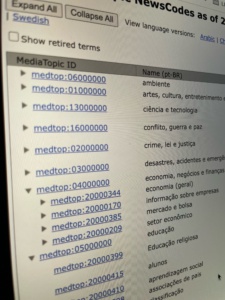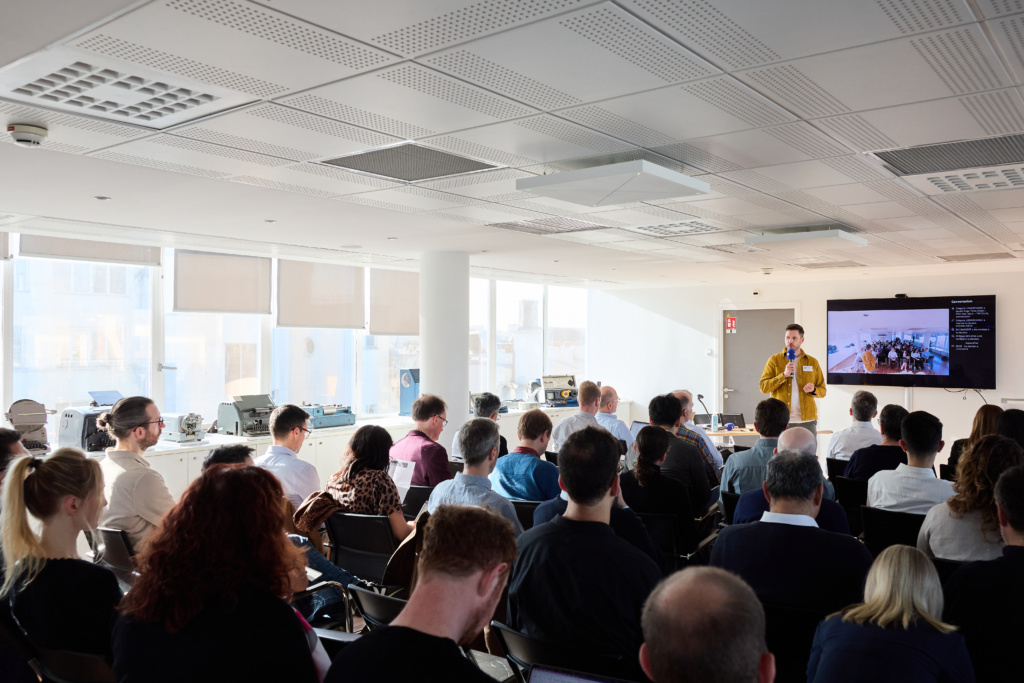Categories
Archives

The IPTC NewsCodes Working Group is pleased to present the Q1 2025 release of IPTC NewsCodes.
As usual, most of the updates are in our flagship subject vocabulary, Media Topics.
Media Topic updates
This release adds 8 new concepts, retires 17 concepts, modifies 43 label names and 64 definitions, adds 10 notes (mostly to retired concepts), makes 28 hierarchy moves and modifies 7 wikidata mappings.
The new and modified terms have already been translated into Swedish (lang=se) and Norwegian (lang=no-NB and lang=no-NN)
New concepts (8 terms)
zoning policy, political party, political movement and association, communism, democratic socialism, theocracy, absolute monarchy, ski mountaineering
Note that ski mountaineering (medtop:20001390) has been added to the Media Topics vocabulary because it was added as a new sport for the 2026 Olympics.
Retired concepts (17 terms)
- civil and public service – use government employee (medtop:20000595) instead.
- military equipment – use military weaponry and equipment (medtop:20000602) instead.
- security measures (defence) – use national security (medtop:20000598) instead.
- national security (old) – Use national security (medtop:20000598) instead.
- public finance – Use government budget (medtop:20000607) or government debt (medtop:20000368) instead.
- government department – Use more specific terms or government (medtop:20000593) instead.
- safety of citizens – Use other terms such as public health (medtop:20001358) or emergency response (medtop:20000168) instead.
- interior policy – Use more specific terms instead.
- personal data collection policy – Use data protection policy (medtop:20000627) instead.
- planning inquiries – Use zoning policy (medtop:20001383), environmental policy (medtop:20000423) or other more specific terms instead.
- political crisis – Use more specific terms instead.
- political process – Use government (medtop:20000593) or other more specific terms instead.
- political parties and movements – Use political party (medtop:20001384) or political movement and association (medtop:20001385) instead.
- political development – Use politics (medtop:11000000) instead.
- civilian service – Use medtop:20001277 volunteering instead.
- integration policy – Use immigration policy (medtop:20000634) instead.
- regulatory authority – Use regulation of industry (medtop:20000636) instead.
Modified labels (43 terms)
politics and government, demonstration, government employee, public officials, constitution (law).
national security.military weaponry and equipment, head of state,local authority, minister or secretary (government), regional authority, taxation policy, data protection policy, immigration policy, summit meeting, treaty, foreign aid, international organisation, refugees and internally displaced people, non-governmental organisation (NGO), political prisoners and dissenters, cultural policy, sports policies, political party convention, political committee, head of government, border dispute, financial service, corporate bond, war victims, missing in action, breaking (breakdance), by-election, recall election, coalition building, zoning policy, political party, political movement and association, communism, democratic socialism, theocracy, absolute monarchy, ski mountaineering.
Modified definitions (64 terms)
politics and government, demonstration, computer networking, economic policy, environmental policy, healthcare policy, government, government employee, public officials, constitution (law), national security, armed forces, military weaponry and equipment, executive (government), government budget, head of state, local authority, minister or secretary (government), regional authority, taxation policy, government policy, nationalisation, privatisation, state-owned enterprise, data protection policy, policy towards indigenous people, pension and welfare policy, personal weapon control policy, immigration policy, nuclear policy, regulation of industry, food and drink regulations, international relations, diplomacy, summit meeting, treaty, economic sanction, foreign aid, international organisation, refugees and internally displaced people, non-governmental organisation (NGO), political prisoners and dissenters, lobbying, political system, democracy, dictatorship, cultural policy, sports policies, regional development policy, political party convention, head of government, infrastructure policy, economic development incentive, political leadership, border dispute, education policy, zoning policy, political party, political movement and association, communism, democratic socialism, theocracy, absolute monarchy, ski mountaineering.
Modified notes (10 terms)
safety of citizens, interior policy, personal data collection policy, planning inquiries, political crisis, political process, political parties and movements, political development, civilian service, integration policy.
Modified broader terms (hierarchy moves) (28 terms)
campaign finance, government employee, public officials, military weaponry and equipment, espionage and intelligence, data protection policy, housing and urban planning policy, policy towards indigenous people, pension and welfare policy, personal data collection policy, personal weapon control policy, planning inquiries, lobbying, political parties and movements, political development, political system, integration policy, regional development policy, infrastructure policy, political leadership, zoning policy, political party, political movement and association, communism, democratic socialism, theocracy, absolute monarchy, ski mountaineering.
Modified wikidata mappings: 7
political party, political movement and association, communism, democratic socialism, theocracy, absolute monarchy, ski mountaineering.
See the official Media Topic vocabulary on the IPTC Controlled Vocabulary server, and an easier-to-navigate tree view. An Excel version of IPTC Media Topics is also available.
Non-Media Topic changes
- New term: Software
- New terms: anonymised, recommended anonymisation

“It has never been more important to safeguard authentic news media,” say the organisers.
“We must strengthen our voice and hold our ground against the big tech players. It is critical that the industry works together,” said Fabrice Fries, Chief Executive Officer at AFP, in his opening remarks for the workshop in Paris.
“At AFP we are committed to ensure that both news organisations and the general public can inspect the provenance of our images. This transparency builds trust,” said Eric Baradat, the global news deputy director for photo and archives at AFP.
AFP, BBC and Media Cluster Norway jointly organised the workshop, which was hosted by AFP and supported by the International Press Telecommunications Council (IPTC). The workshop focused on image metadata and how the C2PA standard, also known as Content Credentials, can safeguard it.
“The challenges the news industry are facing are so great that we can only succeed if we work together. Making sure the public can discern between authentic media and content made by generative AI is vital not only for news organisations, but for democratic societies,” said Helge O. Svela, CEO of Media Cluster Norway.
More than 40 people from over 20 news organisations participated in the full day workshop. Among the presentations was a study commissioned by Media Cluster Norway’s Project Reynir on how media consumers respond to being shown more detailed information about an image. The study was conducted by MediaFutures at the University of Bergen, and built on a user study conducted by the BBC.
“Trust is earned. At the BBC we have seen that users really engage when we show them how their news was made. Extra media provenance details such as when and where an image was taken, or the steps used to verify it, make a real difference to how users trust their news. The C2PA standard can allow us to share this information with the users in a secure and trustworthy way,” said Judy Parnall, Principal Technologist, BBC Research and Development.
Among the participants in the workshop were CBC-Radio Canada, Deutsche Welle, France TV, ITV, NHK and Al Jazeera. Topics discussed included carrying provenance metadata from glass to glass versus adding it at the point of publishing, as well as the importance of redaction to the media industry and content provenance for media archives.
“It is vital that the needs of the news media ecosystem are heard as this technology and standards are further developed and refined,” said Brendan Quinn, Managing Director at IPTC.
The IPTC Media Provenance Committee works on several initiatives for implementing and furthering the development of the C2PA technology for the media industry. Many of the speakers and participants of the Paris workshop are actively involved in this work.
For more information on IPTC and the Media Provenance Committee, contact the IPTC via this site.